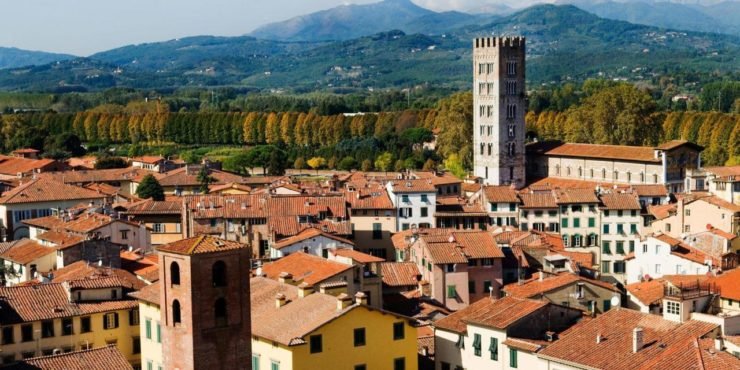10 Most Romantic Places In Italy
2. Lucca
Lucca city of a hundred towers, churches, its tiled roof cast a warm light and narrow winding streets create a medieval atmosphere.
During a leisurely stroll through the city, you can climb to the ramparts – Lucca, one of the few Italian cities, completely walled, and after it is necessary to climb the tower Guinigi: 230 steps lead to a height of 44 meters!

It is not easy, but you can make a stop to take a breath and exchange a kiss. Hence, among the trees, you can admire the magnificent views of the Luka.
Lucca is a city and comune in Tuscany, Central Italy, on the Serchio, in a fertile plain near the Tyrrhenian Sea. It is the capital of the Province of Lucca. It is famous for its intact Renaissance-era city walls.
Lucca was founded by the Etruscans and became a Roman colony in 180 BC. The rectangular grid of its historical centre preserves the Roman street plan, and the Piazza San Michele occupies the site of the ancient forum. Traces of the amphitheatre still may be seen in the Piazza dell’Anfiteatro.
At the Lucca Conference, in 56 BC, Julius Caesar, Pompey, and Crassus reaffirmed their political alliance known as the First Triumvirate.
Frediano, an Irish monk, was bishop of Lucca in the early sixth century. At one point, Lucca was plundered by Odoacer, the first Germanic King of Italy. Lucca was an important city and fortress even in the sixth century, when Narses besieged it for several months in 553. Under the Lombards, it was the seat of a duke who minted his own coins. The Holy Face of Lucca (or Volto Santo), a major relic supposedly carved by Nicodemus, arrived in 742. During the eighth-tenth centuries Lucca was a center of Jewish life, the Jewish community being led by the Kalonymos family. Lucca became prosperous through the silk trade that began in the eleventh century, and came to rival the silks of Byzantium. During the tenth–eleventh centuries Lucca was the capital of the feudal margraviate of Tuscany, more or less independent but owing nominal allegiance to the Holy Roman Emperor.